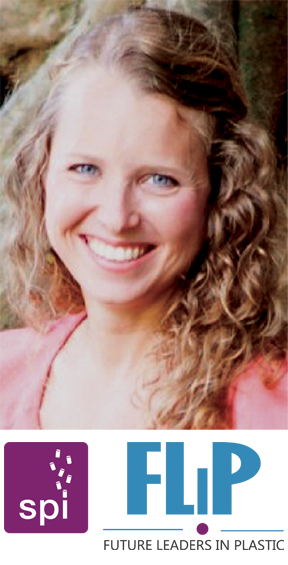The FLiP Files: Beth W. Trenor
Previous Article Next Article
The FLiP Files: Beth W. Trenor
Previous Article Next Article
The FLiP Files: Beth W. Trenor
Previous Article Next Article

The FLiP Files is a blog series spotlighting young professionals that are active in SPI’s Future Leaders in Plastics (FLiP), a group for plastics professionals under the age of 40. For our third entry, we spoke to FLiP member Beth W. Trenor of Milliken & Company.
- Where do you work and what’s your title?
Milliken & Company, Regulatory Affairs Specialist
- Tell us a little about what your company does.
Milliken & Company is historically known for textiles, but we have several other divisions, including floor covering, performance fabrics and specialty chemicals. I work in the Plastic Additives business within the Chemical Division, which is focused on ingredients for polymers that enhance physical and aesthetic properties of plastic parts.
- How did you find yourself working in the plastics industry?
I started my career as a research & development lab technician, primarily doing synthesis and analysis of new products for use in plastics. I transferred to the regulatory department three years ago and now focus on compliance of newly invented additives for plastics. There are lots of food-contact applications and global chemical regulations, and my work touches almost every part of the supply chain.
- Has anyone in the industry mentored you?
Honestly, I couldn’t name just one person. Everyone I’ve interacted with has been a mentor to me in some way. I learn something new from every person I meet, and that’s why organizations like SPI are so important! There’s always someone who has worked in your position and has some helpful advice or hints, so it’s important to listen and ask questions of those who have “been there.”
- Describe in one sentence what you do on an average day.
Ensure our products can be sold legally and ethically throughout the world.
- What do you like most about working in the plastics industry?
Variety is the spice of life. There are so many facets to the plastics industry, it never reaches the point of feeling “routine” for me.
- What’s one thing about your personal life that you feel has been changed by having a career in plastics?
When shopping or dining, I always like to check the bottom of plastic cups and containers to see what they’re made of and if our additives are used. It’s fun to see the final product of something I helped put on a shelf.
- What are the major challenges you think are facing the plastics industry today? How do you think the industry can overcome them?
The global regulatory landscape is becoming increasingly complex and difficult to comply with, especially in cases where maintaining confidential business information comes into play. I think compliance challenges can be overcome with increased communication and understanding of these challenges throughout the supply chain. Companies can work together to reach a solution, and I can see SPI playing a big role in helping achieve this.
The other big challenge I see is public perception of “plastics” and “dangerous chemicals in plastics”. Again, I think SPI and those of us in the industry can work together and help project a better message that is backed by science.
- Why do you think someone from your generation should consider a career in plastics?
Like I said above, it’s the variety – there are SO many different career paths and roles that you can take within the plastics industry.
- What’s one plastic product you couldn’t live without?
Currently: baby bottles and sippy cups – my son turned one year old this month, and we have these all over the house!